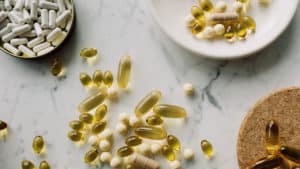Candida albicans is a type of single-celled yeast that resides in the digestive tract. In healthy amounts, it is benign and even aids in proper digestion and nutrient absorption. But when candida overgrowth occurs, it can cause a myriad of health issues. When most of us hear about candida overgrowth or yeast infections, we immediately think of athlete’s foot, vaginal yeast infections, ringworm, or nail fungus. While these infections are generally easy to treat, those with compromised immune function may develop chronic and systemic (throughout the body) candida overgrowth.
Once candida takes a foothold, it can be much more difficult to treat. Since yeast releases toxic by-products that further weaken the immune system, it can become a vicious cycle. This chronic form of candida overgrowth is sometimes referred to as candidiasis. Fungal infections can even be fatal in certain circumstances. This happens when candida enters the bloodstream and infects every organ in the body, causing a type of blood poisoning called candida septicemia.
Systemic Symptoms
Some or all of the following symptoms are often present in those with a candida problem. While several laboratory tests are available to detect the presence of an overgrowth, signs, and symptoms are a good indicator of whether further testing is needed:
- Leaky gut/dysbiosis
- Allergies (food or seasonal)
- Chemical and environmental sensitivities
- Fatigue/malaise
- Decreased libido
- Muscle/joint pain
- Autoimmune conditions
- Fibromyalgia or Chronic Fatigue Syndrome
- Skin problems
- Mood disturbances
- Frequent vaginal yeast infections or urinary tract infections
- Interstitial Cystitis
- Rectal itching
- Premenstrual Syndrome
- Thyroid dysfunction
- Poor concentration, brain fog, ADD
- Digestive complaints (ie. constipation, bloating, irritable bowel syndrome)
- Skin and nail fungal infections
- Sugar and carbohydrate cravings
Causes/Contributors
Since candida overgrowth occurs when it becomes out of balance with other microbes, such as beneficial bacteria in the intestines, the cause is often a combination of factors that directly or indirectly deplete these bacteria or feed the yeast:
- Over-use of antibiotics
- Other medications (ie. oral contraceptives, corticosteroids)
- Stress
- Pregnancy/change in hormones
- Mercury toxicity
- Diet high in fermented foods (in sensitive individuals)
- Diet high in sugars and refined carbohydrates
- Cancer, severe burns, and any other condition or medication that causes immune suppression
How to Combat Candida
If you think you may be suffering from candidiasis, you may want to ask your health care provider about available testing. A few of the options include testing for antibodies to candida (IgG, IgA, IgM), stool testing, or a urine test to detect the presence of D-Arabinitol (a waste product of candida). If antibodies are tested, it is prudent to check for total IgGs as well, since a suppressed immune system could prevent a normal antibody response and result in a false negative. Some experienced clinicians report seeing a pattern of low white blood cell and lymphocyte count, along with high neutrophils, in those with candida overgrowth.
There are pharmaceutical agents effective at treating stubborn yeast, such as Nystatin, and stronger meds such as Diflucan, Sporanox, and Lamisil. These stronger medications require careful monitoring due to their potential for causing liver toxicity. Your doctor can help determine the severity of your candida problem and whether pharmaceuticals are needed. Thankfully, there are other strategies to help combat yeast overgrowth naturally with minimal to no side effects. Dietary and lifestyle tips to help starve the yeast as well as strengthen the immune system include:
- Consume generous amounts of fresh vegetables and fiber
- Cook with herbs such as garlic and oregano, which contain powerful anti-microbial properties
- Drink at least half your body weight in ounces of purified water daily
- Add coconut oil to your diet, which contains the anti-fungal compound caprylic acid
- Avoid/limit alcohol, caffeine, added sugars, refined carbohydrates, gluten grains, yeast, dairy, and vinegar-based or aged foods (apple cider vinegar is an exception if well tolerated)
- Identify food sensitivities/heal “leaky gut” (to prevent yeast from entering the bloodstream)
- Supplement with 20+ billion live probiotic cultures daily, including lactobacillus acidophilus and Bifidobacterium bifidum
- Aim for aerobic exercise 3-5 times per week
- Get adequate sleep
- Reduce stress
Candinex
Many botanicals have been shown to be very effective against candida without the side effects associated with prescription antifungals. Candinex by Holtraceuticals is a unique blend of natural antifungal compounds such as caprylic acid, berberine sulphate, and extracts from oregano, olive leaf, and grapefruit seed. Often, individuals experience worsening symptoms temporarily while treating candida overgrowth, due to the toxins released as yeast cells are killed off. This formula includes agents for detoxification support as well, such as milk thistle (Silybum marianum) extract and alpha-lipoic acid, to help the liver effectively process these toxins so as to reduce associated “die-off” symptoms such as headaches, muscle pain, and fatigue.
A few other nutrients and supplements that may additionally be helpful in supporting an individual with a weakened immune system and who is depleted by candida overgrowth are B vitamins, vitamin C with bioflavonoids, magnesium, calcium, vitamin D, vitamin K, free form amino acids, essential fatty acids, quercetin, colostrum, coenzyme Q10, tea tree oil (melaleuca alternifolia), and a “beneficial yeast” called saccharomyces bouvardia that can essentially crowd out candida. A knowledgeable health care practitioner can help determine your individual nutritional needs and guide a treatment plan since certain strains of candida can become resistant if treated inadequately. While this may be just one of the infections involved in your chronic health condition, it is certainly one that should not be overlooked if complete healing and feeling your best is your ultimate goal.
*Always consult your healthcare practitioner before starting supplementation


